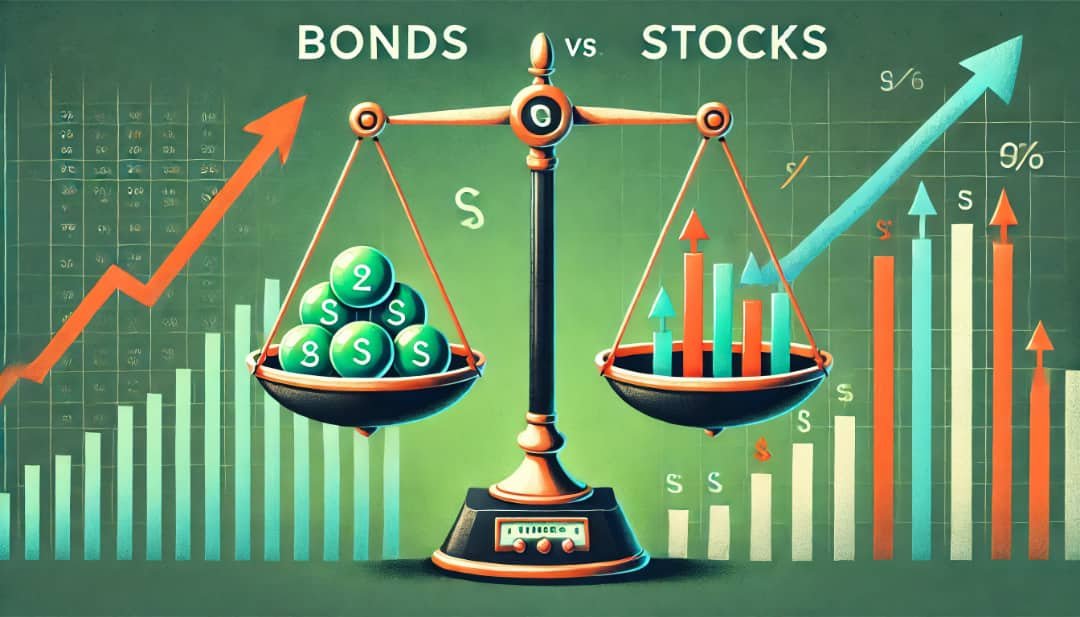Understanding the Basics of Bonds and Stocks
Investing in financial markets can be a daunting task, especially for beginners. Two of the most common investment vehicles are bonds and stocks. While both offer opportunities for growth and income, they are fundamentally different in terms of risk, return, and structure. This article aims to provide a comprehensive comparison of bonds and stocks, helping you make informed investment decisions.

What Are Bonds?
Bonds are essentially loans made by investors to borrowers, which can be governments, municipalities, or corporations. When you purchase a bond, you are lending money to the issuer in exchange for periodic interest payments and the return of the bond’s face value when it matures.
Types of Bonds
- Government Bonds: Issued by national governments and considered low-risk.
- Municipal Bonds: Issued by local governments or municipalities, often tax-exempt.
- Corporate Bonds: Issued by companies to raise capital, generally offering higher yields but with higher risk.
- Zero-Coupon Bonds: Sold at a discount and do not pay periodic interest, but pay the face value at maturity.
How Bonds Work
When you buy a bond, you agree to lend a specific amount of money (the principal) to the issuer for a set period. In return, the issuer agrees to pay you interest (coupon) at regular intervals. Upon maturity, the issuer repays the principal amount. The interest rate and the creditworthiness of the issuer determine the bond’s yield.
What Are Stocks?
Stocks, also known as equities, represent ownership in a company. When you buy a stock, you purchase a share of the company, making you a partial owner. Stocks are traded on stock exchanges, and their prices fluctuate based on the company’s performance and market conditions.
Types of Stocks
- Common Stocks: Provide voting rights and potential dividends, but come with higher risk.
- Preferred Stocks: Offer fixed dividends and have priority over common stocks in asset liquidation, but usually lack voting rights.
- Growth Stocks: Companies expected to grow at an above-average rate, often reinvesting earnings rather than paying dividends.
- Value Stocks: Companies considered undervalued based on fundamentals, often paying dividends.
How Stocks Work
When you purchase a stock, you become a shareholder and gain a claim on part of the company’s assets and earnings. The value of your investment can increase through capital gains if the stock price rises or through dividends if the company distributes a portion of its profits to shareholders. However, stock prices can also fall, leading to potential losses.
Key Differences Between Bonds and Stocks
Risk and Return
One of the most significant differences between bonds and stocks is the level of risk and potential return associated with each.
- Bonds: Generally considered lower risk because they provide fixed interest payments and return the principal at maturity. However, they offer lower potential returns compared to stocks.
- Stocks: Higher risk due to price volatility and the potential for loss of principal. However, they offer higher potential returns through capital gains and dividends.
Ownership and Claims
The nature of ownership and claims on assets also differs between bonds and stocks.
- Bonds: Bondholders are creditors to the issuer and have a higher claim on assets in case of bankruptcy. They do not have ownership rights or voting power.
- Stocks: Shareholders are partial owners of the company and have voting rights. They have a lower claim on assets in case of bankruptcy, receiving payouts only after bondholders are paid.
Income Generation
The way bonds and stocks generate income for investors is another key difference.
- Bonds: Provide regular interest payments (coupons) and return the principal at maturity, offering a predictable income stream.
- Stocks: Generate income through dividends, which are not guaranteed and can fluctuate based on the company’s performance and dividend policy.
Market Volatility
The sensitivity to market conditions varies between bonds and stocks.
- Bonds: Generally less volatile than stocks, but can be affected by interest rate changes, inflation, and credit risk.
- Stocks: More volatile due to factors such as company performance, market sentiment, and economic conditions.
Advantages and Disadvantages of Bonds and Stocks
Advantages of Bonds
- Lower Risk: Bonds are generally less risky than stocks, making them suitable for conservative investors.
- Predictable Income: Regular interest payments provide a steady income stream.
- Capital Preservation: Bonds return the principal amount at maturity, preserving capital.
Disadvantages of Bonds
- Lower Returns: Bonds typically offer lower returns compared to stocks.
- Interest Rate Risk: Bond prices can fall if interest rates rise.
- Credit Risk: The issuer may default on interest payments or principal repayment.
Advantages of Stocks
- Higher Returns: Stocks have the potential for higher returns through capital gains and dividends.
- Ownership Rights: Shareholders have voting rights and a claim on company assets and earnings.
- Inflation Hedge: Stocks can provide a hedge against inflation as companies can increase prices and earnings over time.
Disadvantages of Stocks
- Higher Risk: Stocks are more volatile and can result in significant losses.
- Uncertain Income: Dividends are not guaranteed and can fluctuate.
- Market Sentiment: Stock prices can be influenced by market sentiment and external factors beyond the company’s control.
Investment Strategies for Bonds and Stocks
Bond Investment Strategies
Investors can employ various strategies to maximise returns and manage risk when investing in bonds.
- Laddering: Building a portfolio of bonds with different maturities to reduce interest rate risk and provide a steady income stream.
- Barbell Strategy: Investing in short-term and long-term bonds to balance risk and return.
- Bond Funds: Investing in bond mutual funds or exchange-traded funds (ETFs) to diversify and reduce individual bond risk.
Stock Investment Strategies
Stock investors can use various strategies to achieve their financial goals and manage risk.
- Buy and Hold: Investing in quality stocks for the long term to benefit from capital appreciation and dividends.
- Value Investing: Identifying undervalued stocks based on fundamental analysis and holding them until their true value is realised.
- Growth Investing: Focusing on companies with high growth potential, even if they have higher valuations.
- Dividend Investing: Investing in companies with a history of paying and increasing dividends to generate a steady income stream.
Comparative Analysis: Bonds vs Stocks
To provide a clearer comparison, let’s summarise the key differences between bonds and stocks in a table:
| Aspect | Bonds | Stocks |
|---|---|---|
| Risk | Lower | Higher |
| Return | Lower | Higher |
| Ownership | No | Yes |
| Income | Fixed interest payments | Dividends (variable) |
| Market Volatility | Lower | Higher |
| Claim on Assets | Higher (creditor) | Lower (shareholder) |
Conclusion: Making the Right Choice
Both bonds and stocks have their unique advantages and disadvantages, making them suitable for different types of investors and financial goals. Bonds are ideal for conservative investors seeking lower risk and predictable income, while stocks are better suited for those willing to take on higher risk for the potential of higher returns.
Ultimately, a well-diversified portfolio that includes both bonds and stocks can help balance risk and return, providing a more stable and rewarding investment experience. By understanding the key differences between these two investment vehicles, you can make more informed decisions and build a portfolio that aligns with your financial objectives.
Q&A Section
1. What are the main differences between bonds and stocks?
The main differences between bonds and stocks are risk, return, ownership, income generation, market volatility, and claims on assets. Bonds are generally lower risk with fixed interest payments, while stocks offer higher potential returns but come with higher risk and variable dividends.
2. Which is safer to invest in, bonds or stocks?
Bonds are generally considered safer than stocks because they provide fixed interest payments and return the principal at maturity. However, they offer lower potential returns compared to stocks, which are more volatile and can result in significant losses.
3. Can I lose money investing in bonds?
Yes, you can lose money investing in bonds if the issuer defaults on interest payments or principal repayment. Additionally, bond prices can fall if interest rates rise, leading to potential losses if you sell the bond before maturity.
4. How do stocks generate income for investors?
Stocks generate income for investors through dividends, which are a portion of the company’s profits distributed to shareholders. However, dividends are not guaranteed and can fluctuate based on the company’s performance and dividend policy.
5. What is a diversified portfolio?
A diversified portfolio is an investment strategy that involves holding a variety of assets, such as bonds, stocks, and other securities, to reduce risk and improve returns. Diversification helps spread risk across different asset classes and sectors, providing a more stable investment experience.
Further Reading:














 How to trade CFD? (00:49)
How to trade CFD? (00:49) How to trade binary options*? (01:22)
How to trade binary options*? (01:22) Forex. How to start? (01:01)
Forex. How to start? (01:01)